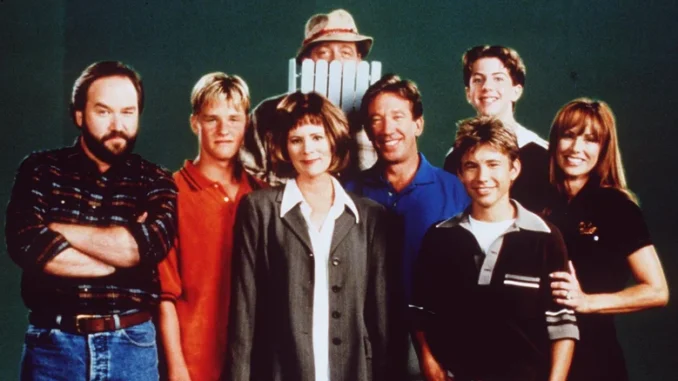
Home Improvement was one of the most popular and successful sitcoms of the 1990s, running for eight seasons from 1991 to 1999. The show’s blend of humor, family dynamics, and Tim Allen’s charismatic performance made it a TV staple for nearly a decade. So why did the show come to an end after such a successful run? While there were several factors involved, the decision to wrap up Home Improvement was a mix of creative, personal, and professional reasons. Here’s a closer look at why the show ultimately ended:
1. Tim Allen’s Desire to Move On
A significant factor in the decision to end Home Improvement was Tim Allen’s own desire to move on and explore other opportunities. By the late ’90s, Tim Allen had become one of the highest-paid actors in television, and he was ready to expand his career beyond the role of Tim “The Tool Man” Taylor.
In interviews, Allen has mentioned that by the time the show reached its eighth season, he felt it was time to move on and try different projects, particularly in film. His success in movies like The Santa Clause (1994) and Toy Story (1995) had expanded his career beyond television, and he was eager to take on new roles and explore other creative avenues. Allen later admitted that while he loved the Home Improvement experience, he didn’t want to be pigeonholed into playing the same character forever, and he felt it was the right time to let the show end.
2. Contract Negotiations and Salary Demands
Another contributing factor was the negotiations surrounding the show’s contract. By the late seasons, the cast members were making significant amounts of money, and the show’s producers were facing the challenge of keeping costs in check while maintaining the show’s high production values. Tim Allen had become one of the highest-paid actors on television by the time Home Improvement entered its final seasons, reportedly earning around $1.25 million per episode during the later years of the show.
The increased salary demands and growing costs of the production likely played a role in the decision to conclude the series. There was pressure to ensure that the financial situation surrounding the show remained sustainable, and Home Improvement had already enjoyed a long and successful run. As Allen had expressed a desire to move on, it made sense for the producers to wrap things up on a high note, rather than risk overextending the show’s run and compromising its quality.
3. Creative Fatigue
By the time Home Improvement reached its eighth season, there was a sense of creative fatigue among the cast and crew. While the show had continued to be popular, keeping a long-running sitcom fresh and funny over several years is challenging. Over the years, the show had explored various storylines about Tim’s family life, his relationship with his wife Jill, and his mishaps as a TV host. After so many seasons, the writers likely felt they had explored all the core storylines they could with the existing characters.

In addition, the introduction of new characters, such as Tim’s neighbor, Wilson (played by Earl Hindman), and the focus on Tim’s relationship with his sons, meant that the show had to keep evolving. The writers might have found it difficult to maintain the same level of creativity and excitement for the series. As with many long-running sitcoms, it was hard to keep the show’s core concept engaging without running out of ideas or repeating the same jokes.
4. The End of the Character Arc
By the end of season 8, Home Improvement had explored many aspects of Tim’s character arc. Tim had grown as a husband, father, and TV personality. The character’s development over the years was clear, and it seemed that there was not much more to explore in terms of the core storyline. The show had taken Tim from a bumbling, well-meaning but flawed husband to a more self-aware and responsible family man.
The final season also dealt with significant life changes for the characters. Tim’s son Brad (played by Zachery Ty Bryan) was preparing for college, and the show touched on themes of growing up, family separation, and change. The finale, titled The Long and Winding Road, was a poignant way to close out the series. The characters had reached a point where their stories were coming to a natural conclusion, and it felt like the right time to wrap up the show without overstaying its welcome.
5. The Cast’s Evolving Careers
By the time Home Improvement ended, many of the cast members were also at a point where they wanted to pursue other career opportunities. Tim Allen, as mentioned, was already expanding into film and voice acting, and other cast members had their own aspirations. For example:
- Patricia Richardson (Jill Taylor), who played Tim’s wife, expressed interest in pursuing other roles after the show ended, and she went on to appear in a variety of television and film projects.
- Jonathan Taylor Thomas, who played Tim’s son Randy, was already considering a career beyond acting. By the time the show was wrapping up, Thomas had become a teen idol, and he had started focusing on his education and other interests, including directing.
- Zachery Ty Bryan (Brad Taylor) and Taran Noah Smith (Mark Taylor) also pursued their own paths after the show. Bryan took on a few acting roles but eventually shifted to producing, while Smith moved into other ventures, including business.
As the cast’s individual career goals evolved, it seemed like a natural point for Home Improvement to conclude, especially as several main characters had outgrown their roles.
6. The Show’s Legacy
While there were certainly reasons for ending the series, the decision to wrap up Home Improvement came while the show was still quite popular. Ending the series on a high note, rather than letting it drag on too long, allowed Home Improvement to maintain its legacy as one of the top-rated sitcoms of the 1990s.
The show’s final episode aired on May 25, 1999, and it concluded with an emotional farewell that reflected the themes of family, growth, and the passing of time. The characters, particularly Tim and Jill, had come full circle, and the show ended in a way that felt satisfying for fans who had followed the Taylor family through the years.
A Natural End
In the end, Home Improvement ended because Tim Allen was ready to move on, the show’s creative team felt they had explored the characters and storylines to their fullest, and the cast was eager to pursue new opportunities. While Home Improvement could have continued for more seasons, the decision to wrap up the show allowed it to go out on a high note, leaving behind a legacy as one of the most beloved sitcoms of the ’90s. The series’ final season and emotional farewell were a fitting end to a decade-long journey with Tim “The Tool Man” Taylor and his family.